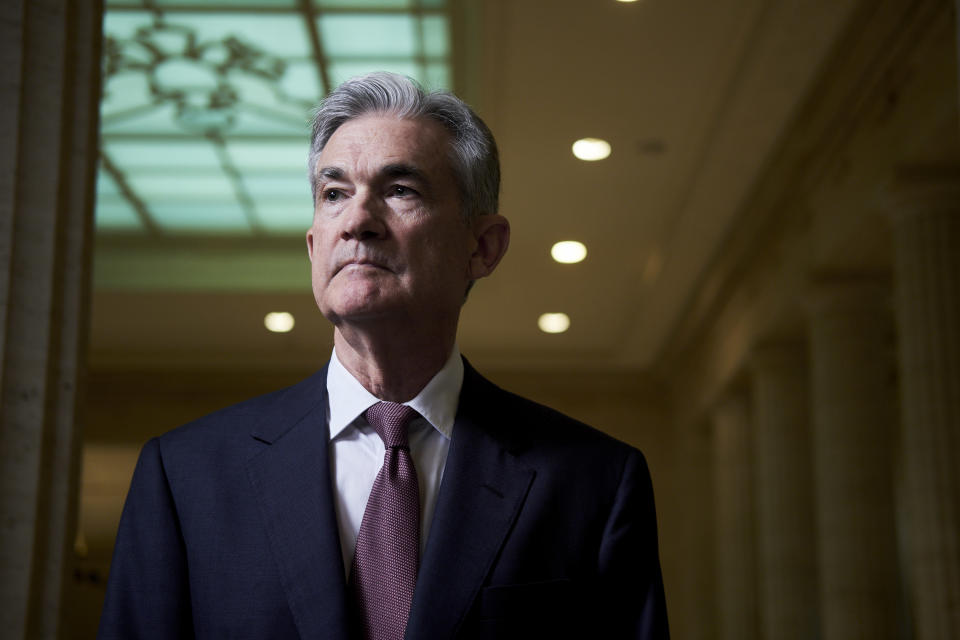Nasdaq closes at year-to-date highs
Stocks ended Wednesday’s session higher, and the Nasdaq closed at year-to-date highs.
As of market close, the S&P 500 (^GSPC) rose 0.35%, or 10.01 points, as the Financials and Technology sectors drove the index higher. The tech ETF, XLK, soared to all-time highs to close out Wednesday’s trading session. The Dow (^DJI) was up 6.58 points, or 0.03%, and the Nasdaq (^IXIC) jumped 0.69%, or 54.97 points.
The Labor Department released CPI data for March Wednesday morning. CPI is often looked to as a key inflation gauge. During the month, core CPI rose 0.1% from February and 2% from last year. Economists polled by Bloomberg are expecting core CPI to have risen 0.2% from last month and 2.1% from last year. March saw the biggest drop in apparel prices since 1949.
“A rebound in energy prices is likely to have pushed headline inflation back up towards 2% in March, but core inflation should have remained well contained,” Capital Economics wrote in a note. “We don’t expect gasoline prices to continue rising, however, particularly not when global growth is slowing, so headline inflation should drop back again over the coming months.”
CEOs from the big banks were in Capitol Hill to testify before the House Committee of Financial Services. The event is called “Holding Megabanks Accountable: A Review of Global Systemically Important Banks 10 Years After the Financial Crisis.”
Citigroup (C) CEO Michael Corbat, JPMorgan Chase (JPM) CEO Jamie Dimon, Morgan Stanley (MS) CEO James Gorman, Bank of America (BAC) CEO Brian Moynihan, State Street (STT) CEO Ronald O’Hanley, Bank of New York Mellon (BK) CEO Charles Scharf and Goldman Sachs (GS) CEO David Solomon were in attendance.
Each CEO submitted public statements on Monday evening ahead of the hearing.
[Read more: Bank CEOs set for Capitol Hill grilling]
Fed’s March meeting minutes
In addition, the minutes from the Federal Open Market Committee’s (FOMC) March meeting were released Wednesday afternoon. The minutes revealed that the committee plans to stay data dependent as it assesses economic conditions and will remain flexible.
“Several participants noted that their views of the appropriate target range for the federal funds rate could shift in either direction based on incoming data and other developments. Some participants indicated that if the economy evolved as they currently expected, with economic growth above its longer-run trend rate, they would likely judge it appropriate to raise the target range for the federal funds rate modestly later this year,” the minutes revealed.
FOMC officials outlined growing risks and thus concluded that there was little reason to continue hiking interest rates.
“A majority of participants expected that the evolution of the economic outlook and risks to the outlook would likely warrant leaving the target range unchanged for the remainder of the year,” the minutes said. “Participants commented on a number of risks associated with their outlook for economic activity. A few participants noted that there remained a high level of uncertainty associated with international developments, including ongoing trade talks and Brexit deliberations, although a couple of participants remarked that the risks of adverse outcomes were somewhat lower than in January.”

STOCKS: Delta and Levi soar on earnings, Apple falls on downgrade, Uber plans to sell $10 billion of stock in IPO
Delta (DAL) shares rose after reporting better-than-expected first-quarter earnings. The airline earned 96 cents per share, which was above analysts’ expectations for 90 cents per share. Delta generated $10.47 billion in revenue. Analysts were anticipating $10.42 billion in revenue during the quarter. Delta has been able to avoid negative impact from Boeing’s (BA) recent woes. The airline does not have any of the Boeing 737 MAX airplanes in its fleet.
Levi Strauss (LEVI) stock surged nearly 4% after releasing its first earnings report since its IPO on March 21. The iconic denim brand earned 37 cents per share on $1.44 billion in revenue.
Apple (AAPL) shares fell after HSBC downgraded the stock from Hold to Reduce but raised the price target from $160 to $180. The firm cited concerns over margins in Apple’s services business and expressed skepticism over the tech giant’s streaming push.
Ride-sharing giant Uber is planning to sell around $10 billion worth of stock in its IPO, according to a Reuters report. If that comes to fruition, that would make Uber’s IPO one of the biggest tech IPOs in history, edging out Alibaba (BABA). Uber is currently seeking a valuation between $90 billion and $100 billion and will be kicking off its roadshow during the week of April 29.
[Read more: The top 10 US IPOs in the last decade]
—
Heidi Chung is a reporter at Yahoo Finance. Follow her on Twitter: @heidi_chung.
Follow Yahoo Finance on Twitter, Facebook, Instagram, Flipboard, LinkedIn, and reddit.
More from Heidi:
The U.S. economy adds 196,000 jobs, beating expectations
Key factors to consider before jumping into hot IPOs, according to UBS



